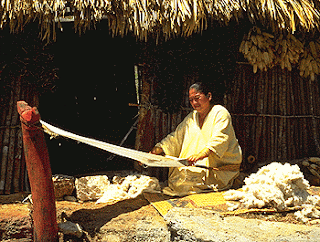Maya was a pre-Columbian civilisation in Mesoamerica.
The Spanish arrived in the Caribbean in the early 16th century and eventually conquered the whole region of what we now call Central and South America. Except for Brazil, where the Portuguese got there first. Until then, the major Mesoamerican cultures were the Maya, the Incas, Aztecs and Olmecs.
The name Maya was not in fact what the people called themselves. Their political culture developed as a number of city states and it wasn't until the city of Mayapan became the predominant political and cultural capital that the name Maya came into usage, in the 13th, 14th and early 15th centuries. Mayan peoples still identified themselves by their sub cultures such as the Yucatecs, the Tztzil and the Tzeltal. I'm not sure why there are so many instances of the letter z in Mesoamerican names but they can be useful in Scrabble - if your house rules allow proper names.
Rather than bore you with a dry historical journey, which I am definitely not qualified to write, my interest was piqued by the discovery that Mayan people still live today. Can you guess how many? I'd have ignorantly thought maybe a few hundred thousand but it's actually around six million! Primarily in Mexico, they also live in Guatemala, Honduras, El Salvador and Belize. There are apparently 31 distinct groups, speaking different, mutually unintelligible (at least according to the Canadian Museum of History) languages. I imagine that's a bit like a Cornishman trying to understand a Geordie. When I was a young teenager, a Londoner, I went with my parents to an event in Scotland and I literally could not understand a word of what the locals said.
The modern Mayan people maintain many of their historical customs. They engage in agriculture and practise various crafts.
Although of course many have adapted to and adopted modern cultures, traditional groups still follow the old ways. The Lacandón of the Chiapas rain forest, in Mexico, hunted with bow and arrow until the 1950s. One of the biggest threats to the Mayan culture is their felling of tropical rain forests to to make way for corn fields. This obviously doesn't endear them to the modern world. Or Greta Thunberg.I would love to be able to visit Mayan sites such as Chichen Itza.
This is one of the "new seven wonders of the world", voted by tens of millions of people in a contest run by a Swiss company, The New 7 Wonders Foundation (which, frankly, isn't the catchiest name they could have used). I'm going to post separately about them. You might like to think about what you'd include in the list, before I start.
I guess modern nations have been pretty slow to recognise and respect the old civilisations and peoples in their midst. The Native Americans, the Aborigines, the Kikuyu and many others have suffered greatly at the hands of colonial conquerors and today's nation states perhaps don't understand the concepts of city states, tribal groupings and diverse languages, or the desire of their people to maintain their traditions. Homogeneity rules! I hope one day I will get to see Chichen Itza; in doing so, I will do my part in honouring an amazing culture.






